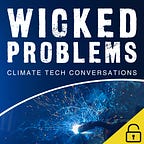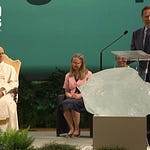In writing about places you might not want to visit without redundant exit strategies, few people have been able to top the late PJ O’Rourke. “Being a humorist is not as dignified as being a war correspondent, but in many ways it’s more effective,” he quips in Holidays in Hell.
Peter Schwartzstein manages to pull off the trick of being both in this occasionally gobsmacking account of his reporting on the “climate security” beat. His new book, The Heat and the Fury - On The Front Lines of Climate Violence, has a deadly serious message: a hotter world is demonstrably a more violent world, at every level from domestic violence to civil war. It’s as bracing as The Uninhabitable Earth by David Wallace Wells (who blurbs the book). But it’s delivered not as a po-faced “attention must be paid” jeremiad but reported stories of real people in real places he - unlike people whose idea of stressful journey is a long queue in the sun at COP27 before heading into a world of AC, corporate canapés, and PowerPoint - has actually spent the last decade plus reporting from.
Which allows Schwartzstein plenty of authority and scope to tell stories that dramatise how difficult is is to report for real on something called “climate security” - stopped at borders and having books obliquely referencing “sex” be confiscated, jumping out of a taxi to run from militant kidnappers in Basra, and hearing the death-wail of an elderly source he’d just interviewed who succumbed to a heat death that ordinary AC could have prevented.
Like a lot of correspondents and analysts based in the Eastern Med, Gulf, Africa and South Asia who I’ve become friends with over the years, Schwartzstein either developed or was born with a dark humour that makes these stories digestible. But few of them have a chance to put it into their reporting. This book gives him that freedom.
So do have a listen to our conversation. But some other thoughts in case you’re not convinced:
Climate and Violence
On this topic many people think of Syria, where Schwartzstein explains that while climate change didn't directly cause the civil war, it played a significant role in weakening societal tolerance toward the Assad regime’s corruption and mismanagement. The drought that hit Syria in the years leading up to the conflict contributed to widespread poverty and rural migration, factors that made citizens more susceptible to joining revolutionary movements.
The West and Climate-Related Violence
But climate-related violence is not limited to developing countries. Schwartzstein shares his experience of living in Athens, where rising summer temperatures have contributed to an increase in gender-based violence and other forms of social unrest. He points out that even in wealthier nations, where infrastructure is better equipped to handle climate shocks, the growing frequency of extreme weather events is pushing systems to their breaking points.
This emerging trend mirrors broader global patterns, with wealthier urban centers often being insulated from the immediate effects of climate change, while poorer, rural areas bear the brunt. Schwartzstein warns that climate violence will become a growing concern for the developed world as well.
The Role of Governance
Peter’s analysis spotlights the interplay between climate stress and governance. He argues that poor governance makes worse the effects of climate change, often leading to violence. Whether it's government mismanagement of natural resources or failure to provide adequate services, these institutional failures, combined with climate pressures, create a volatile mix that fuels unrest.
As he recounts, in Senegal the French colonial government and later the independent Senegalese state tried to address land scarcity by creating new grazing zones for herders. However, this intervention backfired, as the herders soon overused the land, leading to degradation and conflict.
Climate Security and Solutions
Schwartzstein also tackles the topic of "climate security," a term gaining traction in international policy circles. Purely tech solutions, he argues, might be helpful but could make things even worse without improving governance.
Ending on a Hopeful Note
Despite the dire circumstances outlined in The Heat and the Fury, Schwartzstein ends on a somewhat hopeful note. He argues that while climate-related violence is a significant challenge, there are ways to mitigate it. He highlights successful examples of local-level environmental peacebuilding efforts, where communities have worked together to manage shared resources and reduce tensions. These efforts, while small, offer a glimpse of what could be possible on a larger scale with the right leadership and international support.
Catalysts
Here are the key books and articles referenced by Peter Schwartzstein during this episode:
The Heat and the Fury: Reporting from the Front Lines of Climate Violence by Peter Schwartzstein (available in the US on September 24 and in the UK and other regions on September 26).
The Leopard by Giuseppe Tomasi di Lampedusa (for vivid depictions of extreme weather events like droughts and floods).
A Day in the Life of Ivan Denisovich by Alexander Solzhenitsyn (on the brutal cold in Soviet labor camps).
The Distant Mirror: The Calamitous 14th Century by Barbara Tuchman (a look at societal responses to environmental crises like the Black Death).
The Earth Transformed by Peter Frankopan (on the role of environmental factors in shaping human history).
PJ O’Rourke may have not been the best writer warning about the effects of climate change, but he’s pretty hard to beat on human fallibility:
“No drug, not even alcohol, causes the fundamental ills of society. If we’re looking for the source of our troubles, we shouldn’t test people for drugs, we should test them for stupidity, ignorance, greed, and love of power.”
Thanks for listening.















